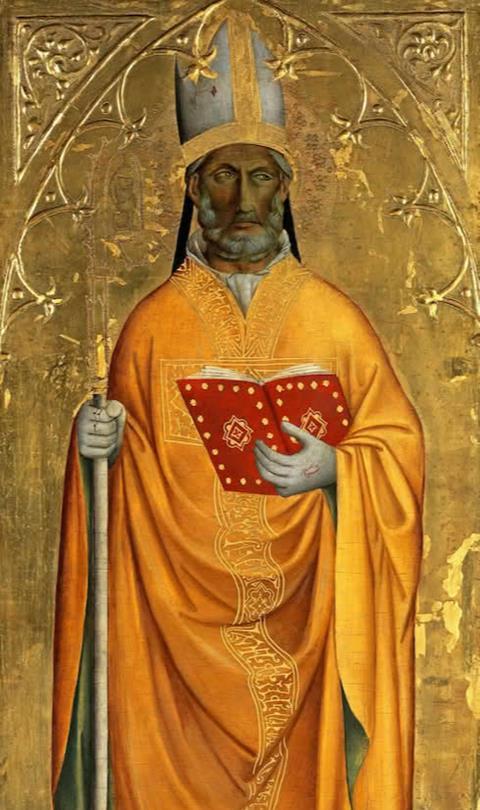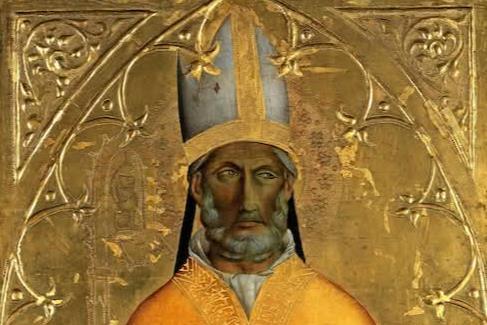Premier Christianity uses cookies Read our cookie policy.
By 2025-10-31T15:22:00+00:00
After years of avoiding Church history, theology graduate Jean Kabasomi made a shocking discovery: St Augustine of Hippo was African. Here’s why one of Christianity’s most influential figures matters for Black Christians today
I’m a theology graduate, but sometimes I feel like a fraud. Why? Because I don’t really know much about Church history. I specialised in biblical studies, which means I haven’t studied history since my first year at university.
I did do a module on how Christianity shaped Western economic thought as part of my masters degree, but I’ve always felt that I don’t really know much about the development of Christian theology post the apostles. I mean, I know of the Church Fathers, but I haven’t read much of their work…
So, a few years ago I bought myself a copy of Martin Luther’s 95Theses. I read a bit of it but, quite frankly, I got bored and put it down. Then, more recently, I found myself with not much to do one summer afternoon and decided to go to the Bodleian Library in Oxford. I ended up reading some Tertullian (the first writer in Latin known to use the term ‘trinity’) and Eusebius’ The Church History. I found it to be a surprisingly pleasant experience.
Africa isn’t just playing its part in Christianity today. It has been contributing for at least a millennium and a half
My assumptions about public theology and engagement on social media were challenged. I was reminded that the writers in the Early Church took no prisoners. If you were preaching false doctrines, you were not only called out but insulted as well. I got the impression that it was critical you were cut off, to prevent further contagion among fellow Christians and new converts. That day, I vowed I would read all the writings of the Church Fathers.
That was in 2023. It wasn’t until earlier this year that I remembered my vow. St Augustine’s City of God has long been on my mind, but I kept putting it off. I knew Augustine of Hippo was a major player and hugely influential, arguably only superseded by Jesus and Paul. But it wasn’t until September of this year that I knew he was an African! I might be ignorant. I have already told you history isn’t my strong point, but I am a theology graduate with two degrees and I missed it.
If I didn’t know this, perhaps many more Christians are completely unaware of this important fact.
St Augustine of Hippo (not to be confused with St Augustine the missionary to Britain) was born in modern day Algeria, of Berber descent, and referred to himself as a Roman African. Since George Floyd’s death, there has been an attempt to re-affirm Augustine’s African status, and to (at least in America) identify him as Black.
This is partly based on the fact that the Arab invasion of Algeria took place in the seventh century – more than 200 years after Augustine’s death. This suggests that people living in Algeria before the Arab invasion could have been darker – and therefore, Augustine may have been Black.
As a Black British African, I think Black History Month should incorporate and reflect all contributions throughout history of people from Africa and the Caribbean. I don’t know how light or dark Augustine was, I just know that he was from Africa.
But why is this important?
For far too long, a narrative has prevailed amongst diaspora Africans and Caribbeans that Christianity is a European, white man’s religion set up to enslave Africans. But that isn’t true. Christianity was twisted by some Europeans to segregate, violate, murder and destroy people on the African continent and beyond. But that isn’t the only story.
Africans need to know that the second most influential Christian (after Paul, obviously Jesus wasn’t a Christian), is not a European but an African. Augustine’s contribution to the Western world is not just confined to theology but stretches to politics, philosophy, sociology, morals and ethics. Africa isn’t just playing its part in Christianity today. It has been contributing for at least a millennium and a half (Tertullian, who I mentioned earlier, was another African Church Father from the second century AD).
This isn’t just about remembering and representation, it’s also about identity. For many in the Black Church, rigorous inspection of the scriptures feels foreign. Many African and Caribbean Christians have been taught that theology is not for them; it is an elitist pursuit that may hinder rather than help their faith. Though not explicitly stated as such, it is implied that the study of theology is for white people who are into head knowledge which puffs up, rather than God. I remember being warned not to study theology by pastors. While they might have had the best of intentions, in my opinion, they were wrong. It’s one of the best decisions I have made.
By fully embracing Augustine and his works, my hope is that more Africans will take hold of his example to know, study and understand scripture. Not for head knowledge, but to preach sound messages, to be better witnesses, to strengthen ordinary Christians and stand firm against modern day heretics. We as Africans, especially in the charismatic movement, need to embrace and return to our strong history of theology. This is not at the expense of preaching or evangelism. Augustine preached thousands of sermons and won many to Christ yet pursued theology deeply and passionately.
The more I read, the more I understand how important his contribution has been. If more people had read Augustine, our opinions on sexual abuse, politics, good governance, women and their contribution to the Church would not have evolved at the slow pace they have done so. As I read his work, I am shocked at how modern he seems. Writing 1,500 years ago, much of what he says is still applicable to today.
For many in the Black Church, theology feels foreign; an elitist pursuit that may hinder rather than help their faith
Reading Church history can help us understand how the Bible was interpreted in the time it was written. Reading how doctrines were developed and understood by the disciples of the first disciples, just a few hundred years after Christ prevents us, 2,000 years later, forming junk theology or hearing ‘revelations’ from the Spirit that can never be revelations. Augustine and the Church Fathers are part of the multitude of counsellors that bring safety when we read the Bible.
The growth of the Church in Africa is often reported in Western Christian circles. We are impressed – and long for a similar move of the Spirit in our churches. However, what is usually missing from this reporting is the lack of accountability, systems and structures needed to facilitate healthy growth in these churches.
Americans and Europeans do not need to teach Africans how to address these challenges. Instead, the African Church needs theologians from within its own walls to rise up and be counted. It needs men and women who can rightly divide the word of God (in its original languages), unpack and digest the mistakes from the past, grapple with the complex writings of the Fathers, hold pastors and teachers to account, and reveal old truths to a new generation in the same spirit and power as St Augustine. 


Grab this Deal!
We’re celebrating a remarkable journey from our humble beginnings as Buzz in the 1960s to the vibrant, multi-platform publication we are today. One thing has remained constant: our commitment to connecting faith with the world around us. To celebrate our birthday, we are offering you a Print and Digital subscription for just £24 your first 12 months!
Subscribe Today
*Offer applies in UK only, but check here for our overseas offers
2025-10-17T14:32:00Z
The rapper, poet and preacher’s third album Blameless demonstrates how Christian artists can stay authentic to their cultural heritage while glorifying God. It’s a message that’s particularly relevant during Black History Month, says Maxine Harrison
2025-08-28T12:54:00Z
The problem with Christianity in the UK is that we’re looking in the wrong direction, says Nick Page. It’s time to stop assuming our brothers and sisters across the pond have all the answers, and look to the example of Christians in the Majority World
2024-10-30T09:56:00Z
The Redeemed Christian Church of God (RCCG) has a vision to plant a church within five minutes’ walking or driving distance of every home worldwide. As part of Black History Month, George Luke looks at the church’s Nigerian origins, and reports on how it is experiencing significant growth in the UK
2025-08-13T09:15:00Z
St John Henry Newman, one of the most influential English theologians of the 19th century, is to be made a Doctor of the Church by Pope Leo. Jack Chisnall, who lived in Newman’s room at Oxford, explains what it means – and the impact Newman had on his own life and faith
2025-04-17T09:11:00Z
Today marks 50 years since the beginning of the Khmer Rouge’s reign of terror, during which 1.3 million people were killed and buried in the Cambodian Killing Fields. In looking at the history, Julia Cameron unearths a shocking story of God’s lavish grace
2024-10-22T07:23:00Z
Sam Sharpe was a Jamaican Baptist deacon who was hung for inciting a riot in 1831. He played a key role in ending the enslavement of Africans in the Caribbean. This Black History Month, Rev Dr Carlton Turner pays tribute to the faith of a man who sought to bring freedom to his people
Site powered by Webvision Cloud

